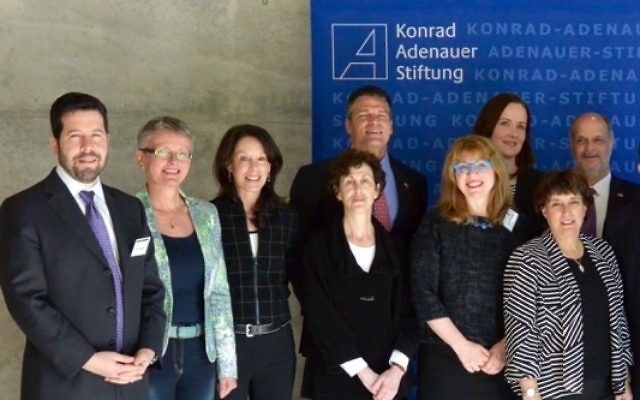AJC Mission Finds German Jews Feel Secure
By Melanie Nelkin and Ilene Engel
“Whoever wishes to deny our special obligations towards the Jews and the state of Israel is not just historically and morally but also politically blind.” Those powerful words from Konrad Adenauer, West Germany’s first chancellor, made it clear that reconciliation with the Jewish people and the state of Israel was a top priority.

American Jewish Committee, known as the State Department for the Jewish people, is instrumental in helping ensure that government policies continue to support the 220,000 Jews in Germany today.
AJC became the first Jewish organization to work with Germany in its postwar recovery. In 1998, AJC opened its Berlin headquarters, becoming the sole American Jewish organization in Germany.
Today, AJC’s highly respected professional staff plays a leading role in outreach to government, religious, military, media and nongovernmental organization leaders who encourage political action on key issues of Jewish concern. These issues include strengthening the U.S.-German-Israeli partnership; promoting U.S.-European cooperation on Israel, Iran and Mideast affairs; countering anti-Semitism and extremism; and bolstering security for Jews in Germany.
This relationship building includes AJC lay leadership in Atlanta and across the country. In 1980, AJC and the Konrad Adenauer Foundation began an exchange program when German-Jewish relations, in the shadow of the Holocaust, were still tense. The objectives are the same today, presenting a realistic picture of Germany to American Jews and enabling German leaders to have an honest dialogue with the global Jewish community.
In April we were invited to join this program, along with 10 other U.S. participants. We were given access to and had dialogue with government officials at all levels, top newspaper editors and leaders of the Jewish community across Germany.
Germany is doing well economically. We saw construction cranes in Wiesbaden, Frankfurt and Berlin. Interestingly, Germany is Israel’s No. 1 trading partner, and 30,000 Israelis have moved to Berlin in recent years. Germany is the most powerful political force in Europe; Chancellor Angela Merkel is the most powerful leader.
There are certainly a number of challenges, and topping the list is the refugee crisis. The German government is working tirelessly to create an integration process that could be a global model, and Israel is reaching out to Germany to share its expertise.
We had frank conversations regarding anti-Semitism, Iran, the German-Turkish relationship, the rise of right-wing political parties, Russian propaganda and interference in German affairs, Russian aggression in Ukraine and Syria, and Britain’s upcoming vote on whether to remain in the European Union. Numerous speakers expressed grave concerns about the U.S. presidential race.
We experienced two evenings we will never forget. The first was with past exchange participants in Berlin. They shared home hospitality in which we enjoyed a home-cooked meal and an array of German wines and talked tachliss on topics ranging from politics to immigration to Holocaust education.
It was apparent that German guilt over the Holocaust lives on into the third generation after the Shoah.
Our final evening in Germany, after a week of cerebral note-taking and high-level meetings, we spent Shabbat at the Orenienburger Strasse Synagogue. The realization that we were in a Berlin sanctuary with a dark and tragic past, filled with Jews of all ages in 2016, chanting familiar Shabbat prayers loudly and proudly, came suddenly. The experience was intense and emotional.
Admittedly, there were armed guards positioned outside the rainy entrance and a security line with an X-ray machine reminiscent of an airport, but that was quickly forgotten inside the sanctuary.
The collective voice of the German Jewish leadership, which represents 107 communities of Jews, expressed concern about anti-Semitism, but nothing like we’ve heard from Jews in France. They said they feel safe in Germany now.
What better way to end our week than with the knowledge that remembering the past, with an eye toward the future, continues to be an integral priority of the German democratic system? AJC is committed to ensuring the system stays strong for German Jews and Jews around the world.
Melanie Nelkin is the first vice president for AJC Atlanta. Ilene Engel is the vice president of regional diplomacy for AJC Atlanta.




comments